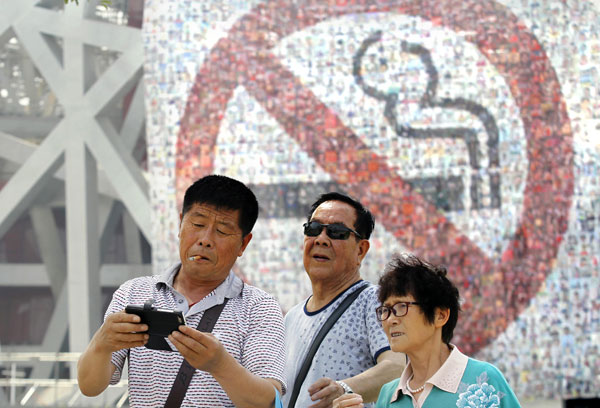- Home > News > Domestic News
- domestic news
Beijing ban may be extended nationwide

A man smokes as he stands in front of an anti-smoking poster in Beijing.(ZHU XINGXIN/CHINA DAILY)
Beijing's smoking ban, which came into effect on June 1 last year and made it illegal to smoke indoors in public places, has curbed smoking in the capital and won widespread public support, according to a survey published on May 27 by the Chinese Association of Tobacco Control.
The results of the survey will provide vital information for lawmakers as the country mulls extending the ban to implement China's first-ever nationwide anti-smoking legislation. The proposed law was drafted by the National Health and Family Planning Commission, which solicited opinions from several government departments, said Mao Qun'an, a spokesman for the commission.
However, insiders said the draft offers too much leeway because it would allow smoking areas to be established in public places, such as restaurants, bars and coffee or tea shops.
Cui Xiaobo, deputy director of the Beijing Tobacco Control Association, said: "That's like setting aside a peeing area in a swimming pool."
The Beijing ban, the strictest in the country's history, prohibits smoking indoors at public places and at outdoor venues, such as schools and children's hospitals.
"It would be a major setback for national smoking control if the law came out that way, because it would set a negative example for stricter regional anti-smoking legislation," Cui said.
Mao said smoking areas in public places cannot protect people from the effects of second-hand smoke: "They also make enforcement of the anti-smoking regulations even harder and more complicated."
Nationwide, many obstacles remain to the full implementation of smoking bans, he said, citing poor public awareness of the health risks posed by both active and passive smoking, and a lack of respect for rules.
Moreover, China's tobacco industry is a State monopoly and the government relies heavily on the revenues generated, which means vested interests may attempt to block or delay measures to control tobacco use, he added.
"The success of Beijing's anti-smoking legislation has demonstrated that it can be done, though," he added.
The survey at 450 public places in the Chinese capital found that the situation has improved markedly since the ban came into force.
The biggest improvements were seen in bars and restaurants, while hospitals were recognized as the best enforcers of the ban, the survey said. Smoking was reported in only 14 percent of the bars visited, compared with 90 percent before the ban came into effect.
Xu Guihua, a researcher at the Chinese Association of Tobacco Control, said the benefits have been recognized by the public, including many smokers. Among the 600 Beijing residents surveyed, 87 percent were aware of the regulations, and more than 93 percent supported the smoking ban, citing improved conditions at public venues.
Angela Pratt, head of the Tobacco Free Initiative at the World Health Organization's China office, said Beijing has demonstrated a comprehensive ban on smoking in public places can be implemented, and people are in favor of a national crackdown.
"The improvements noted are good for Beijing's international image as a smoke-free city," she added.
| Chinese Association on Tobacco Control Copyright © 1992-2011 906-907 Anhuidongli, Chaoyang District Beijing 100101 |